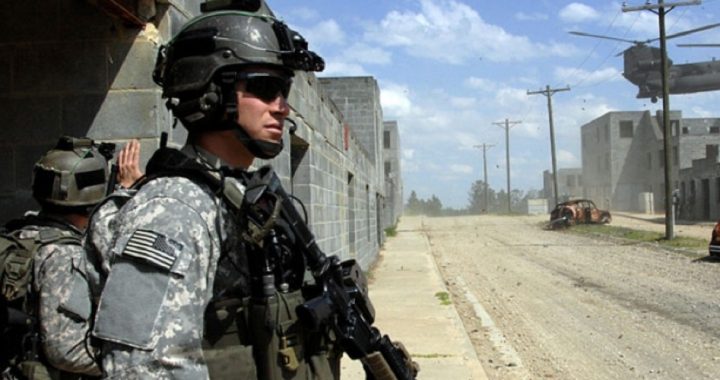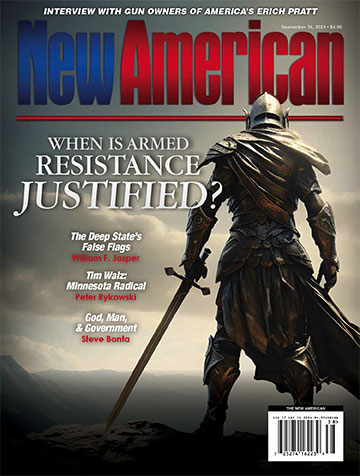
Citizens of Watertown, Massachusetts, know more than most Americans about the weapons, tactics, technology, and vehicles employed by law enforcement.
In the wake of the Boston marathon bombings, residents of Watertown were ordered by police to stay inside and then subjected to involuntary searches of their homes. Besides the obvious violations of the Fourth Amendment’s guarantee of the “right of the people to be secure in their persons, houses, papers, and effects, against unreasonable searches and seizures, Watertown citizens were eyewitnesses to SWAT officers dressed in combat gear using weapons and riding in vehicles more at home in the battlefield than suburbia.
The militarization of local and state law enforcement didn’t make its debut in the Watertown lockdown, however. For decades, police have received millions in grants from the federal government. Cash-strapped police departments and sheriffs’ offices have traded local control for new technology and martial materiel.
The blurring of the lines between armed forces and police forces has accelerated quickly, resulting in a situation where “it would be difficult to discern fully outfitted police SWAT teams and the military.”
Another significant step in fully federalizing and militarizing local law enforcement was taken earlier this week when the Pentagon published amendments to the Federal Register affecting key sections that control civilian and military cooperation in law enforcement.
Under Section 32 CFR Part 182 — Defense Support of Civilian Law Enforcement Agencies — critical and constitutionally suspect changes were made that permit units of the U.S. armed forces to “engage temporarily in activities that are necessary to quell large-scale, unexpected civil disturbances.”
The relevant revision mandates that military assumption of local law enforcement powers is only valid in “extraordinary emergency circumstances where prior authorization by the President is impossible and duly constituted local authorities are unable to control the situation.”
In an excellent article published in the Long Island Press, Jed Morey insightfully revealed the threat in such a subtle, but significant seizure of domestic police power by the Pentagon.
Morey quotes civil liberties attorney Bruce Afran, who calls the issuing of the new regulations “a wanton power grab by the military.” “It’s quite shocking actually because it violates the long-standing presumption that the military is under civilian control,” he adds.
An unnamed “defense official” quoted in Morey’s piece reportedly claimed, “The authorization has been around over 100 years; it’s not a new authority. It’s been there but it hasn’t been exercised. This is a carryover of domestic policy.” In an apparent effort to assuage the fears of constitutionalists, the defense official says that the military doesn’t “want to get involved in civilian law enforcement. It’s one of those red lines that the military hasn’t signed up for.”
Besides, adds the anonymous Pentagon source, “every person in the military swears an oath of allegiance to the Constitution of the United States to defend that Constitution against all enemies foreign and domestic.”
The taking of the oath is not disputed; it’s the fidelity to it that is in doubt.
Morey accurately lays out the law governing the military’s meddling in domestic police activities.
The U.S. military is prohibited from intervening in domestic affairs except where provided under Article IV of the Constitution in cases of domestic violence that threaten the government of a state or the application of federal law. This provision was further clarified both by the Insurrection Act of 1807 and a post-Reconstruction law known as the Posse Comitatus Act of 1878 (PCA). The Insurrection Act specifies the circumstances under which the president may convene the armed forces to suppress an insurrection against any state or the federal government. Furthermore, where an individual state is concerned, consent of the governor must be obtained prior to the deployment of troops. The PCA — passed in response to federal troops that enforced local laws and oversaw elections during Reconstruction — made unauthorized employment of federal troops a punishable offense, thereby giving teeth to the Insurrection Act.
Together, these laws limit executive authority over domestic military action. Yet Monday’s official regulatory changes issued unilaterally by the Department of Defense is a game-changer.
Although the regulations changes were sudden and unpublicized, vigilant constitutionalists were not surprised by this seizure of power. U.S. Army chief of staff General Raymond T. Odierno telegraphed the taking in an article published last year by the Council on Foreign Relations (CFR).
In the May/June 2012 issue of that shadowy organization’s official organ, Foreign Affairs, Odierno and the CFR said the armed forces should address “challenges in the United States itself” in order to keep the homeland safe from domestic disasters, including terrorist attacks. Odierno writes:
Where appropriate we will also dedicate active-duty forces, especially those with niche skills and equipment, to provide civilian officials with a robust set of reliable and rapid response options.
Odierno’s words seem to have been the blueprint the Pentagon used in crafting the new regulations.
As the law now stands, should an “extraordinary emergency circumstance” a la Watertown arise, local police leaders can call out the U.S. Army and bring a “rapid response” force as described by General Odierno that is robust enough to eliminate the problem.
Odierno’s CFR-backed ideas were apparently not the musings of an unknown academic written in an obscure journal of little importance. In light of the Pentagon’s police power power grab, the general’s words were the black-and-white plans for “building a flexible force” as laid out by the man in charge and published for all the world to read by the people who may have put him there.
This latest regulatory revision is but the latest attempt by the Obama administration to convert the military into an all-powerful, unrestrained personal army answerable only to the president and subject to his orders, no matter how unconstitutional.
Consider the National Defense Authorization Act (NDAA); that federal “law” signed by President Obama at the end of 2011 and again in January of this year places the American military at the disposal of the president for the apprehension, arrest, and detention of those suspected of posing a danger to the homeland (whether inside or outside the borders of the United States and whether the suspect be a citizen or foreigner).
Giving the president that power is nothing less than another de facto legislative repeal of the Posse Comitatus Act.
The code rewriting and the NDAA are frightening examples of the federal government’s apparent intent to impose Stalinist-style authoritarianism and place in clear and present danger the Constitution and the God-given liberties that it protects.
Although proposed in April, the rules went into effect on Monday, May 13.
Joe A. Wolverton, II, J.D. is a correspondent for The New American and travels frequently nationwide speaking on topics of nullification, the NDAA, and the surveillance state. He can be reached at [email protected]



